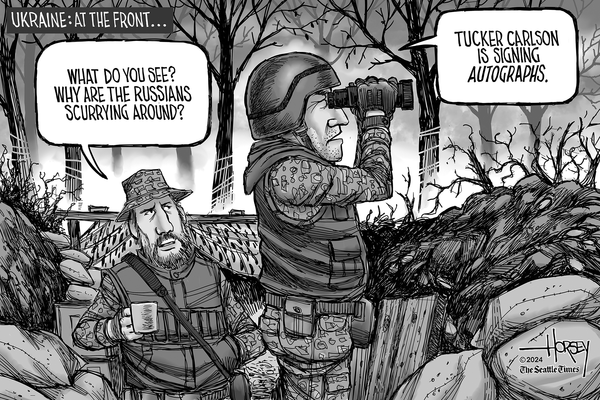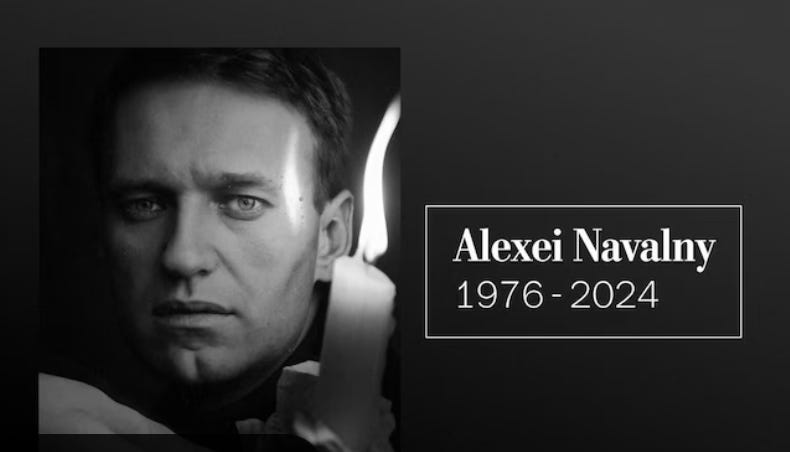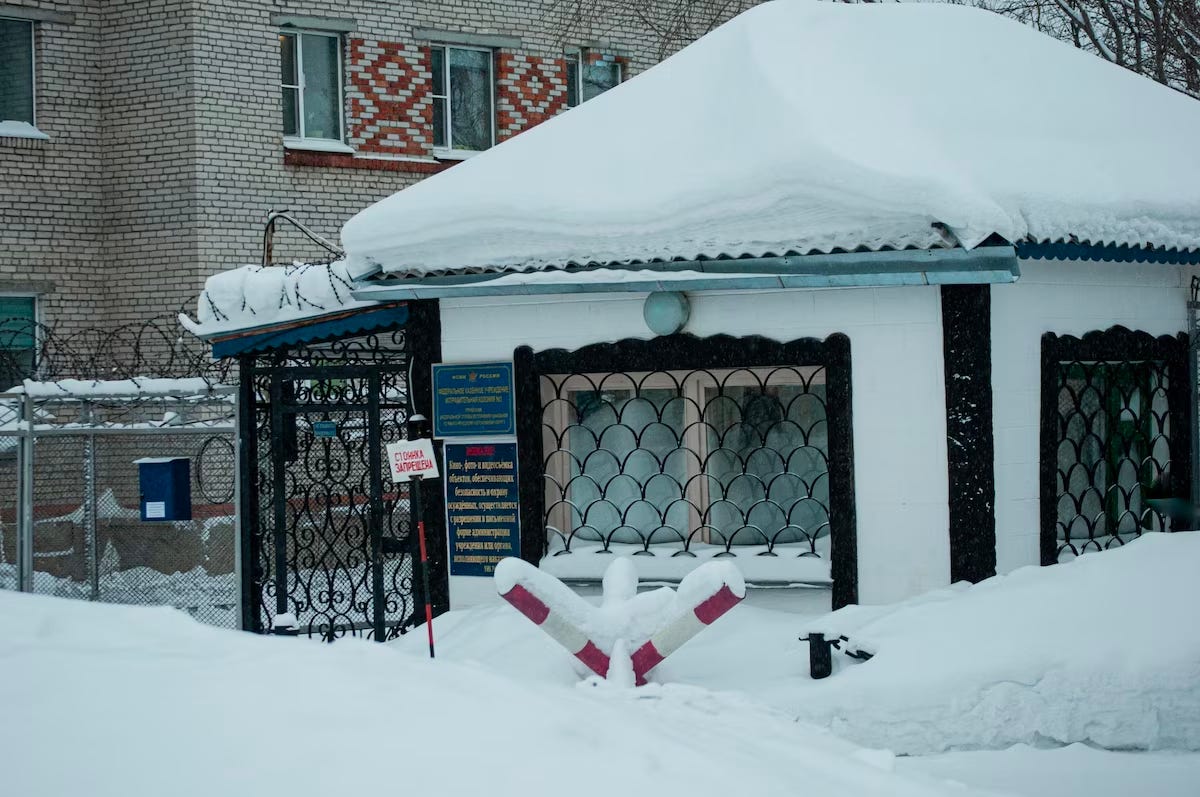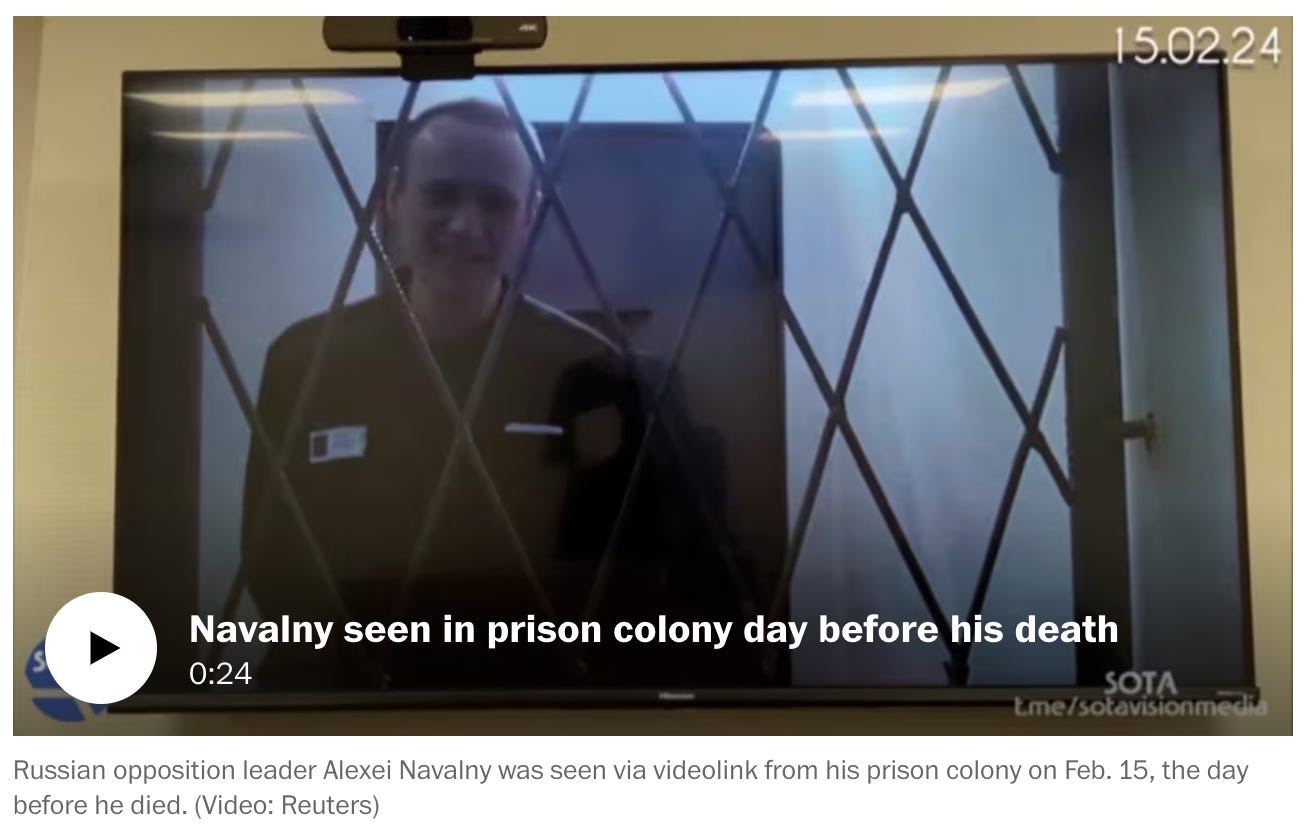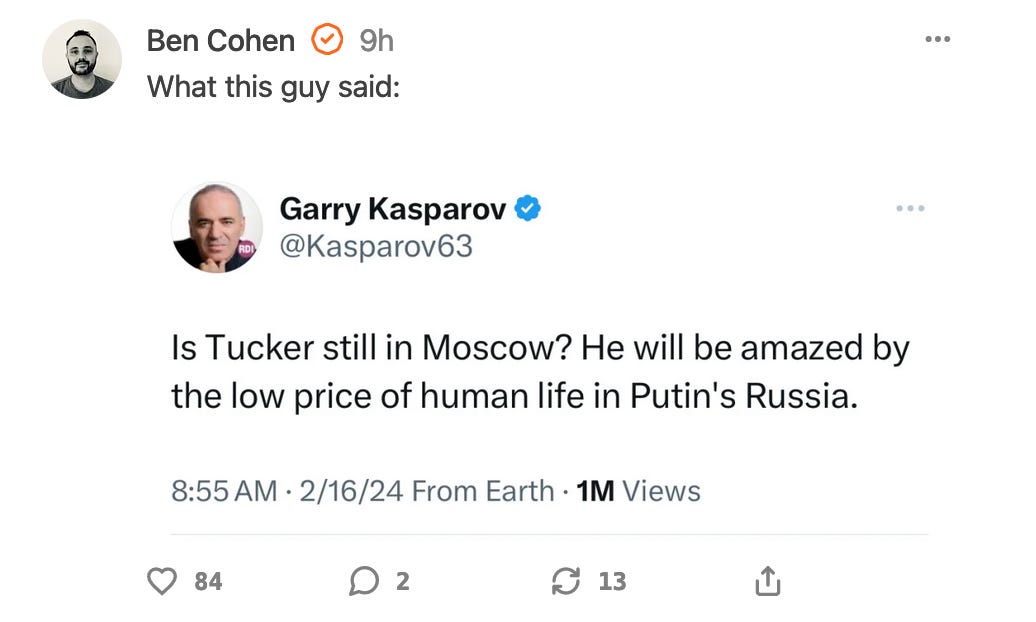The death of Alexei Navalny- Vladimir Putin does his worst to Russia's best
And yet Congressional Republicans will continue sucking up to Putin
If they decide to kill me, it means that we are incredibly strong. We need to utilize this power.
Alexey Navalny
Even from a Russian prison, I can see Putin’s weakness.
Vladimir Kara-Murza
Watching House Speaker Mike Johnson (R-LA) defend the indefensible should be pretty revealing to anyone watching the Congressional GOP Caucus catering to Donald J. Diaperload. There’s no credible argument to be made for withholding military aid from Ukraine…other than the fact that the 45th President wants to create as much chaos as possible and undermine the 46th President, Joe Biden.
It’s not about wanting what’s best for America or the American People. It’s all and only about doing what’s in Donald Trump's best interest. That’s it; that’s all. Nothing else matters. And so, Speaker Johnson would allow Ukraine to go under, thus meaning that a critical US ally would be denied the opportunity to hold back the threat from Russia that American troops might one day be facing themselves.
What happened to the “defeating them there so we don’t have to face them here” doctrine? What happened to providing support to our friends and allies? And, more than anything, what happened to understanding that Russia poses a clear and present danger to American interests worldwide?
Russian President Vladimir Putin stands for everything America isn’t…and yet Republicans in Congress are carrying water for him. WTF??
Putin has ruled Russia with astonishing brutality for 25 years now, but hidden in that brutality is a surprising core of insecurity. For one person to rule a country the size of Russia requires a system that runs on abject fear from top to bottom. Break that chain of fear anywhere, and it means there’s an inflection point where weakness begins to eat at the system, threatening it from the inside. That weakness will grow and metastasize unless it’s discovered early and rooted out with sufficient brutality to warn others from taking a similar path.
Putin solidified his grip on power in 1999, in the aftermath of several mysterious apartment bombings that killed more than 300 people. Putin blamed Chechen terrorists and began a war in Chechnya that presented him as a decisive, tough patriot defending his nation’s interests. However, there have long been suspicions that the bombings were orchestrated by Russian security authorities themselves, to give Moscow an excuse to crack down….
In other words, from the very dawn of his rule, Putin has been associated with repression, deceit and brutality toward his own people. Russia has also destabilized or attacked its neighbors, from Georgia to Moldova, Estonia and Ukraine, and according to the F.B.I. interfered in the U.S. presidential election in 2016.
That is the Russia that Navalny stood against. And that is the Russia that too many Americans have buttressed by opposing aid to Ukraine.
It’s natural to see the loss of Russia’s most important opposition figure as a sign of Putin’s commanding power, but I wonder if it isn’t also a sign of his insecurity.
Alexey Navalny was that inflection point. He knew what he was up against, and he knew that as one person, the odds were that his journey wouldn’t end well. Even facing such long and horrible odds, though, Navalny continued, and his continued existence posed a threat to Putin’s corrupt system.
Vladimir Putin had to find a pretext to expunge him from Russia’s body politic- thus, the attempt to poison him that he miraculously survived. When that didn’t work, it was only a matter of time before the Russian government tried a different strategy. In this case, they built a false case about him. Once in jail, he was never going to come out. Navalny knew it, and Putin’s jailers knew it. There would always be another crime, another trial, another sentence.
But Navalny knew what many others didn’t realize, that his continued imprisonment and the trumped-up charges against him were proof of the government’s insecurity. They couldn’t deal with him as a free man, so they had to find a way to oppress him and silence his voice.
But his continued oppression continued to showcase the weakness of Vladimir Putin and his autocracy.
Even in Russia, in the early hours after his death,
Russian authorities have arrested more than 100 people across the country for attending vigils and protests over the death of Alexei Navalny, according to OVD-Info, a Russia-based human rights group that advocates for freedom of assembly. The group tracked detentions in at least eight cities, including Moscow, St. Petersburg, Murmansk, Rostov-on-Don and Nizhny Novgorod.
Even as many Russians accept their fate and feel nothing can be done to change their situation, there are those, primarily among the younger generations, who aspire for something more, something better for the Russia they want to grow old in. They may have heard stories about what their country was like during perestroika, and while they may not understand what true democracy is, they know they don’t want to spend their lives under a dictator like Vladimir Putin.
What Speaker Johnson and the rest of the feckless Republicans don’t understand is that they could be a part of history. The GOP, a party that allegedly believes in freedom and liberty, could play a part in bringing some version of that to Russia. Instead, they’re playing into the hands of a brutal autocrat who’s using them for his own ends. They’re too stupid and short-sighted to realize what’s happening…and that Putin is using them.
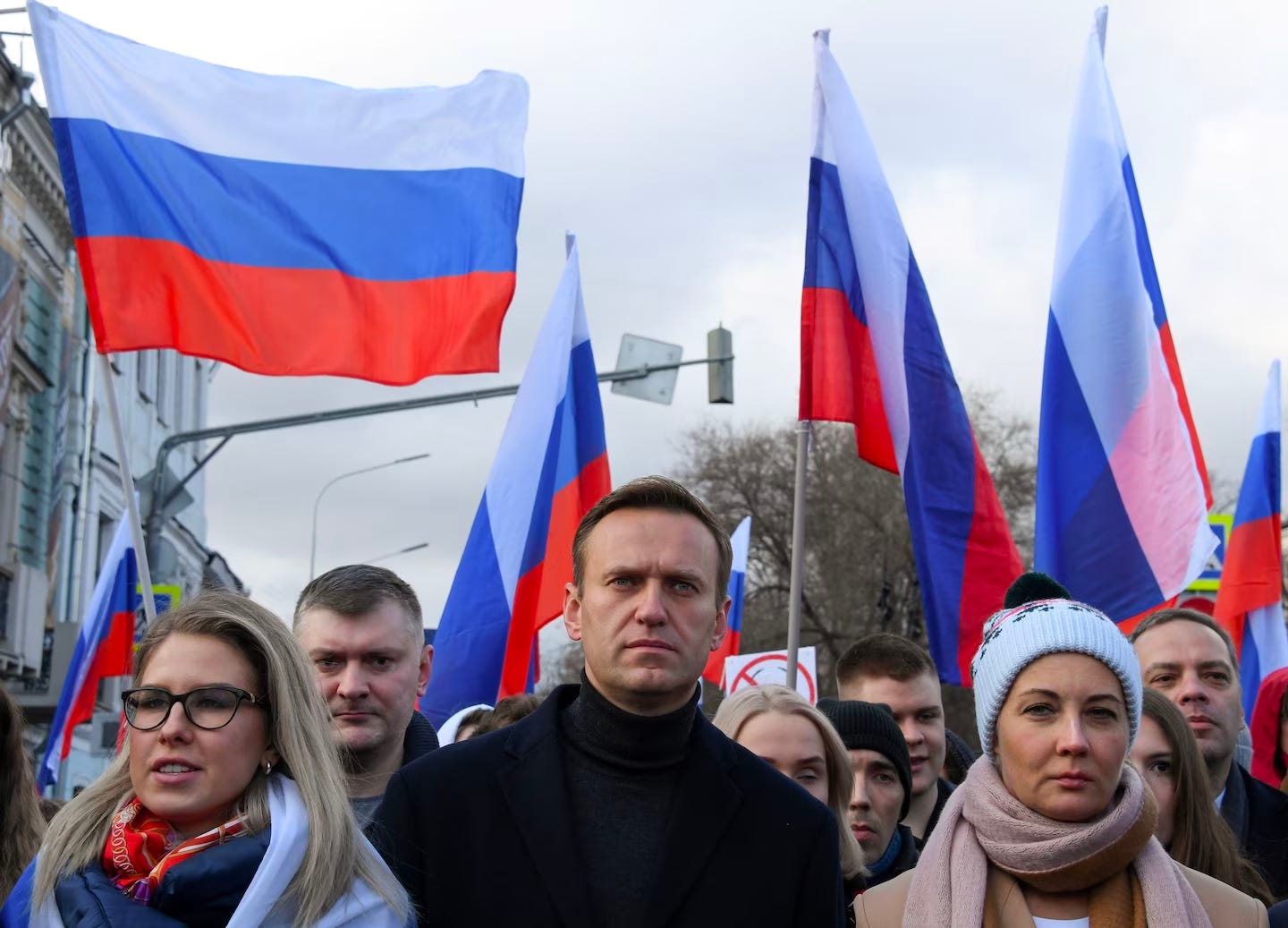
Alexey Navalny could have lived outside of Europe as an activist dissident and perhaps made an even more significant impact than he did from inside Russia. He had a daughter studying at Stanford University and would almost certainly have had his choice of countries that would’ve happily granted him asylum if not outright citizenship.
Navalny loved his country, though, and he wanted to effect change from inside Russia. However, he harbored no fantasies about what awaited him upon landing in Moscow.
On the plane, reporters largely had one question for the opposition leader as he flew back to the near-certain prospect of detention: “Aren’t you afraid?” He said he wasn’t. He was arrested at immigration.
Some may have considered his bravado misguided, and perhaps it was, but he’d made his decision in concert with his wife, Yulia, and so he went into the belly of the beast.
He would never taste freedom again.
Navalny, who was half-Ukrainian, had condemned the Russian invasion of Ukraine and demanded that Russia withdraw from Ukrainian soil and pay reparations. Yet Navalny was widely distrusted within Ukraine and, in some cases, despised for past statements he’d made in which he stated that Russians, Ukrainians, and Belarusians are one people.
(This story was published before his death)
For Navalny, like millions of other Russians with Ukrainian roots, Putin’s war has been a blood-soaked tragedy. It has also put him in political quandary — compelled to change and clarify earlier statements that appeared to deny Ukrainian nationhood as he espoused the idea that Russians, Ukrainians and Belarusians are all one people, and that Crimea, annexed by Putin, was an integral part of Russia wrongfully given to Ukraine by a Soviet leader.
“Of course, it would be great if now we lived in one country with Ukraine and Belarus, but I think that sooner or later it will happen anyway,” Navalny said in 2011, expressing sentiments that could just as easily have passed Putin’s lips.
The remark encapsulates Navalny’s long and contradictory history with Ukraine, which has been a volatile issue in his Russian political career. A new review of his evolving positions also shows why it will be excruciatingly difficult to achieve any reconciliation between the warring neighbors. Many Ukrainians believe they are fighting not only Putin but an aggressive, imperialist mind-set rooted deeply in the Russian population — even Russians like Navalny who want freedom and democracy.
Navalny was not alone in this belief, but for many who grew up in the old USSR and whose heritage spanned what were then republics of the Soviet Union, allegiances were, and in some cases remain, split.
Once Russia invaded Ukraine in February 2022, the lines understandably hardened within Russia, and those whose heritage and/or marriage spanned borders found that their lives became enormously complicated.

Navalny never clarified his views to the satisfaction of Ukrainians, perhaps because he was also half-Russian or maybe because he knew that no matter what he said, he’d lose.
But Navalny harbored a long-held belief in a fraternal bond between Russians, Ukrainians, and Belarusians, believing them to essentially be one people:
“You can call me a Slavic chauvinist, but I believe that Russia’s most important strategic advantage in this raging world is not oil, gas or nuclear bombs, but friendly (and even fraternal, whatever) relations between Russians and Ukrainians and Belarusians,” he wrote. He described spending a week in jail with a Belarusian, an Azerbaijani and an Uzbek — all “good guys” — but Navalny said he felt instant “unity and common cultural codes” with a Belarusian or Ukrainian.
“It’s just immediately clear: They are the same as me. I understand that this is a rather politically incorrect idea.”
He also voiced deep unhappiness that Crimea ever became part of Ukraine. “Crimea was handed over by the illegal voluntaristic decision of the tyrant Khrushchev,” he wrote, referring to Soviet leader Nikita Khrushchev, who transferred Crimea to the Ukrainian Soviet Socialist Republic in 1954. But he also said he opposed absorbing Crimea into Russia — a point that many Ukrainians who now disdain Navalny forget or choose to overlook.
Many Ukrainians chose to overlook that Navalny was half-Ukrainian, instead focusing on his Russian half and insisting that he was the enemy. But Navalny struggled to find a way to mesh his dual identities in a way that would allow him to be understood in both Ukraine and Russia.
Once the war started, any hope of such a rapprochement disappeared, and Alexey Navalny came to be seen as Russian…perhaps because his struggle was in Russia against Vladimir Putin.
The question I have now is what purpose will his life serve…and what response his death will engender from Western governments? As I’ve previously written, I find it difficult to imagine there’s much in the way of options available to the West short of going to war with Russia, which isn’t an option at all. No one wants to be responsible for firing the first shot in what will almost certainly become World War III.
Most of all, no one knows what Vladimir Putin will do with his nuclear arsenal. Is he willing to use it? Is he willing to risk irradiating most of Eastern Europe, including a good part of Western Russia?
There’s little doubt that killing hundreds of thousands of people is well within his wheelhouse. He’s already sent over 300,000 of his Russian compatriots to their deaths, many of them untrained and poorly equipped. To Putin, they’re numbers, abstract concepts, figures to be pushed around on a battlefield map. He has no emotional connection to them; sociopaths like him care nothing for the suffering and deaths of others, even his fellow citizens.
A few hundred thousand more dead? To Vladimir Putin, it’s just a number. As long as his position remains unthreatened, and as long as he has his billions, his dachas, and his yachts, what does he have to worry about?
Speaking only for myself, I hope he swallows a shotgun in a bunker moments before Ukrainian troops get to him.
(All of my posts are now public. Any reader financial support will be considered pledges- support that’s greatly appreciated but not required to get to all of my work. I’ll trust my readers to determine if my work is worthy of their financial support and at what level. To those who do offer their support, thank you. It means more than you know.)





